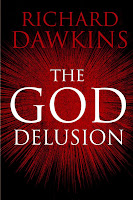 As readers of this blog should know, I’m no fan of the New Atheists. I’ve found them to be as dogmatic in their statements as any religious fundamentalists. And they don’t attack honest religion – they attack rhetorical straw men made up of the worst of religion. I have not criticized them in ignorance – I’ve read numerous articles and essays by and about them (most frequently Christopher Hitchens, but also Richard Dawkins and to a lesser extent, Sam Harris and Daniel Dennett). I felt like I knew what they were doing and why.
As readers of this blog should know, I’m no fan of the New Atheists. I’ve found them to be as dogmatic in their statements as any religious fundamentalists. And they don’t attack honest religion – they attack rhetorical straw men made up of the worst of religion. I have not criticized them in ignorance – I’ve read numerous articles and essays by and about them (most frequently Christopher Hitchens, but also Richard Dawkins and to a lesser extent, Sam Harris and Daniel Dennett). I felt like I knew what they were doing and why.
But until now, I had never read one of their books. My “to be read” list is long, my reading time is limited, and atheism simply doesn’t interest me. After my post on Karen Armstrong’s The Case For God, a comment by Steve Caldwell got me to thinking that I should read at least one – maybe there’s something in their longer work that’s missing in their shorter writings. And so when Cathy and I went shopping for new calendars, I picked up a copy of The God Delusion by Richard Dawkins.
After reading it, my opinion of atheism (new or old) hasn’t changed. But my opinion of Richard Dawkins has.
Dawkins gets the scientific facts right. His explanation of evolution and his refutation of so-called “intelligent design” are excellent – I wish I could get some of my creationist family and friends to read them. His rebuttals to the traditional proofs for the existence of God are strong, and his chapter “Why There Almost Certainly Is No God” is convincing. So what’s the problem?
The problem is that Dawkins defines “God” and “religion” very narrowly, using definitions taken straight from conservative monotheists. In reality, religion functions on three levels: the literal, the ethical, and the mystical. Dawkins debunks the literal (Unitarians got there at least a century before he did), points to the human failures of religion to discount the ethical (but he wrote an article and proudly wears a t-shirt saying “Atheists for Jesus”), and writes off the mystical as misfirings of the brain.
In the first chapter, Dawkins quotes Albert Einstein, who said “To sense that behind anything that can be experienced there is a something that our mind cannot grasp and whose beauty and sublimity reaches us only indirectly and as a feeble reflection, this is religiousness. In this sense I am religious.” Dawkins goes on to say “In this sense I too am religious.” But (and this is important) “I prefer not to call myself religious because it is misleading. It is destructively misleading because, for the vast majority of people, ‘religion’ implies ‘supernatural’.” In other words, Dawkins doesn’t want to be associated in any way with people who believe in the literal God of traditional Western monotheism.
I believe in things Dawkins would call “supernatural” because I have experienced them. These experiences were and are personal, subjective and (for the most part) unrepeatable. I have enough training in science and the scientific method (plus a little humility – here if not in all areas of my life) to know that I can’t reasonably expect anyone to simply take my word for it and accept my private revelation as Truth. But these experiences are meaningful and helpful to me, so I order my life as though they were exactly true.
If this associates me with people who believe things that are clearly false and demonstrably harmful, so be it. I’m not willing to throw out the baby of religion with the bathwater of literalism. There is much about religious belief and practice that is good and meaningful – I’d rather fight to reclaim it than to abandon it to the Pat Robertsons and Osama bin Ladens of the world.
I have accused Dawkins and company of fundamentalism. In that I think I’ve been wrong. Here’s a quote from the chapter “What’s Wrong With Religion? Why Be So Hostile?”
It is all too easy to confuse fundamentalism with passion. I may well appear passionate when I defend evolution against a fundamentalist creationist, but this is not because of a rival fundamentalism of my own. It is because the evidence for evolution is overwhelmingly strong and I am passionately distressed that my opponent can’t see it – or, more usually, refuses to look at it because it contradicts his holy book.
The New Atheists’ passion for science and against repressive religion is admirable. I might go so far to say it’s necessary, given the need to win over a working majority of people on issues such as science education and gay rights. But their broad-brush approach is overly simplistic and ignores the good so many of us find in our personal and collective religious beliefs and practices.
The literal religion that Dawkins et al rant against is dying, albeit very slowly – its death began 500 years or so ago and will not be complete in our lifetimes. But humans are inherently religious. What ultimately replaces literal religion will not be atheism, but something more akin to the religion of Einstein – the sense that there is something else, something bigger, something Ultimate that we cannot intellectually explain but can intuitively experience.
It’s our job to help build it.















